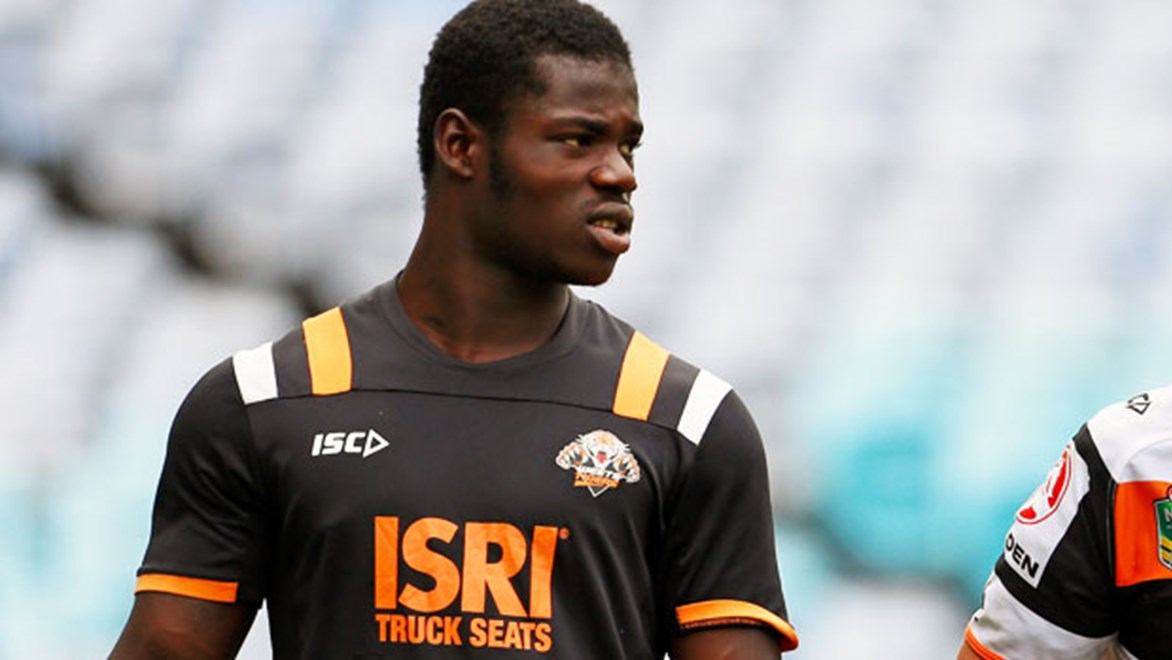

When you first hear it, the words sounds so outlandish, so inexplicable, that you ask him to repeat them again.
"I'm not kidding man," he says. "I can still remember witnessing it, running away from war twice, at the age of two and five years old."
For most kids, the journey through the rugby league ranks is a long and arduous one. For some, like Obed Karwhin, the road set before them is far longer, far more challenging and far more distressing.
The Ivory Coast native will run from the sheds of ANZ Stadium onto the field for the first time on Friday afternoon after being named by Wests Tigers under-20s coach Brett Kimmorley to make his Holden Cup debut.
But 15 years ago, he was running from something else.
"When I was five, we spent one month in the jungle trying to walk from Ivory Coast to Guinea to get away from the war," Karwhin recalls.
"And because countries are so small and close to each other, it's like walking from Sydney to Melbourne. But it took us one month."
The transformation of Karwhin from African refugee to Wests Tigers player should probably be the proudest moment of Blacktown PCYC manager Steve Warwick's coaching career.
But it's not.
And it's because what started with the tutelage of one African kid has turned into the game's first all-African rugby league team: Africa United.
"I'm not going to say it so I get the praise, but I was the first African person he knew, and then I introduced him to more African people. And that's how the African thing started coming," Karwhin says.
Then one African player turned into three all-African rugby league teams.
"I was involved in the first African team to play, which was a great experience. I will never forget about that. Even though we were unlucky on many occasions and never won, putting on the African jersey meant the world to me," Karwhin says.
Three teams then turned into an invitation to an international tournament in Queensland a few years ago, and then an invitation to a memorable Harmony Cup Touch Football tournament victory in Redfern last October.
"They giggled about it because they didn't think this guy could organise an African team to come to Queensland," Warwick remembers.

Now Warwick and the Blacktown PCYC will find out whether they will be awarded a $10,000 grant as part of the Champions of the West program on Wednesday – money that could fund the game's first African-Australian rugby league academy, based in rugby league's heartland of western Sydney.
In other words, a place where they can help more people like Karwhin.
"For these kids, it's a great opportunity for them to get their mind off the things that they saw in Africa – all the war and drama," Karwhin says.
"It's also good to keep them away from trouble, keep them in school, keep them fit and active. It's possible for everyone, whether you're playing reps or you're just playing park football. Rugby league should be enjoyable for everyone and I think PCYC is doing that at the moment.
"Where I'm from, kids will witness some form of violence. Rugby league, I reckon, will be the best sport for them because it's hard, it's tough, physically.
"It can also get their mind off the past. It helped me to get my mind off. It's something I will never forget, but at the same time, playing rugby league gets all the trouble out of my head."
Warwick believes rugby league has given the African community in western Sydney an identity.
"For a lot of them, it has," he says.
"You can see it shape them into different people. I look at some of the background that they've come from, and some of the things that they may have been through... here, their focus is on the game.
"They make a lot of new friends, the people that they decide to associate with, it just makes them a better person. And they love it. They love being included."

Karwhin eventually found a way to Australia with his mother and brother when he was eight, and he met Warwick through a mutual friend.
"He was very nice. I started playing for PCYC at the age of 14 and he started mentoring me since then. He also helped me through my ups and downs, because I was getting rejected by Parramatta Eels for three years in a row," he recalls.
"The first year I tried out at the Eels I wasn't that good and I understood why they didn't pick me.
"But the second time I tried out, I scored three tries in my first trial, two tries in my second trial, and one try in my third trial. And they put me in the development side.
"And then the third year I went for another SG Ball trial. The first and only trial I had, I scored four tries. And Steve was there and he told me I was the best player on the field. I never got a call back from Parramatta Eels.
"But he never let me put my head down. He always encouraged me. He was always there to help. And I was always helping him. We basically started a club together, because after he met me, I introduced all the African kids, I started bringing them to the club.
"That was how we started forming together to form a big club. That was how I met him. He also encouraged me to work hard and luckily I'm playing under-20s."
Last week's PlayNRL round marked the official weekend on the calendar where the game celebrates junior rugby league.
But for Karwhin, he'll be celebrating long after that.
"Steve played a big part in my life as a rugby league player. He helped me a lot through the way, that's something I'll always be grateful for," he said.
"No matter where I am, whether I make it in NRL or not, PCYC will always be a part of my heart. I won't consider myself a leader, but Steve does. So I try to help everywhere I can. Sometimes I train four days a week with Wests Tigers so I go there whatever chance I get to help, and to teach the kids.
"I will also be volunteering as a trainer as a coach for the African academy that they're trying to put together. I've experienced this stuff before and I knew how hard it was for Steve to establish the African team. Maybe by me helping as a coach, maybe I can make things easier for Steve."

